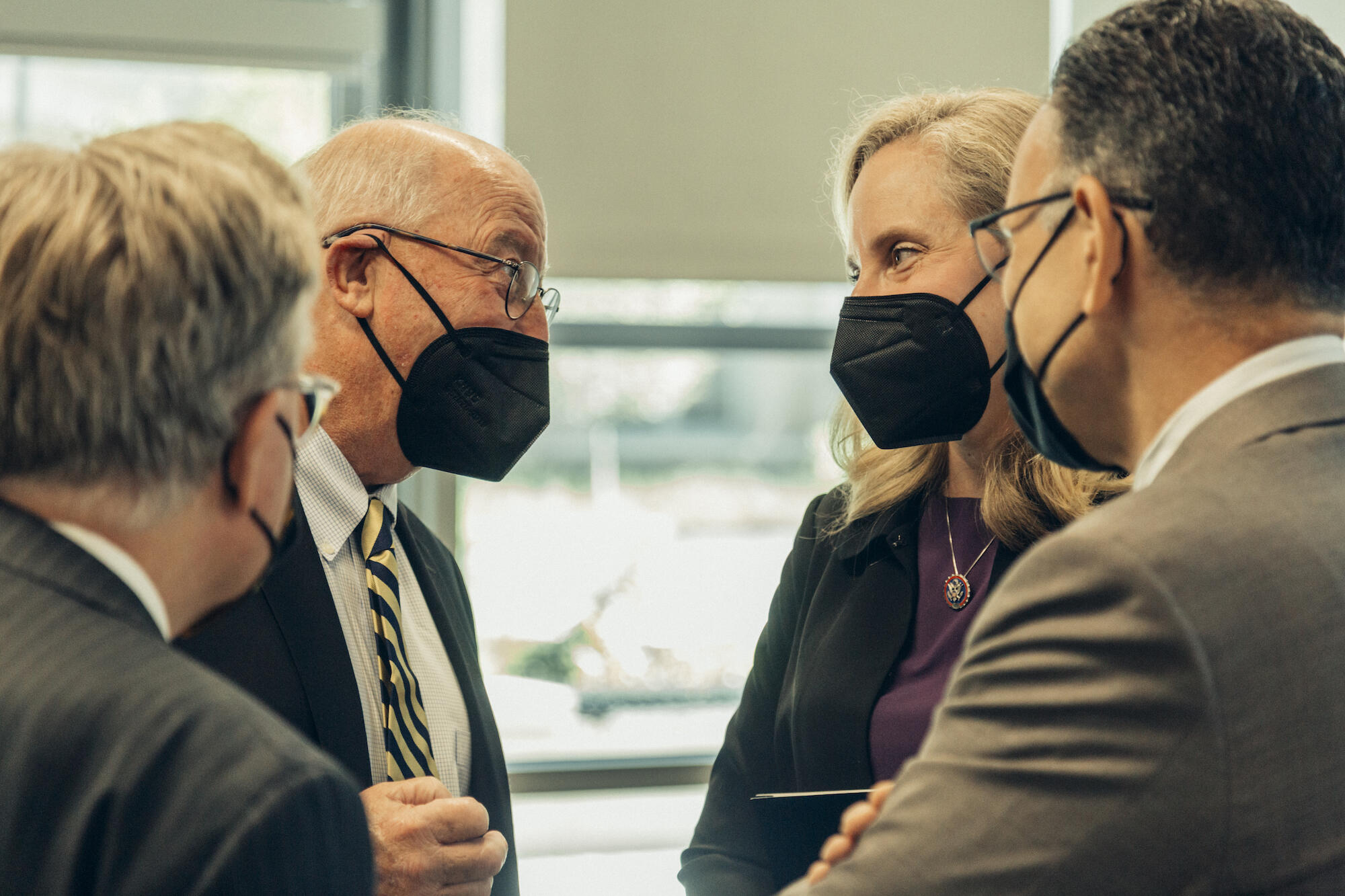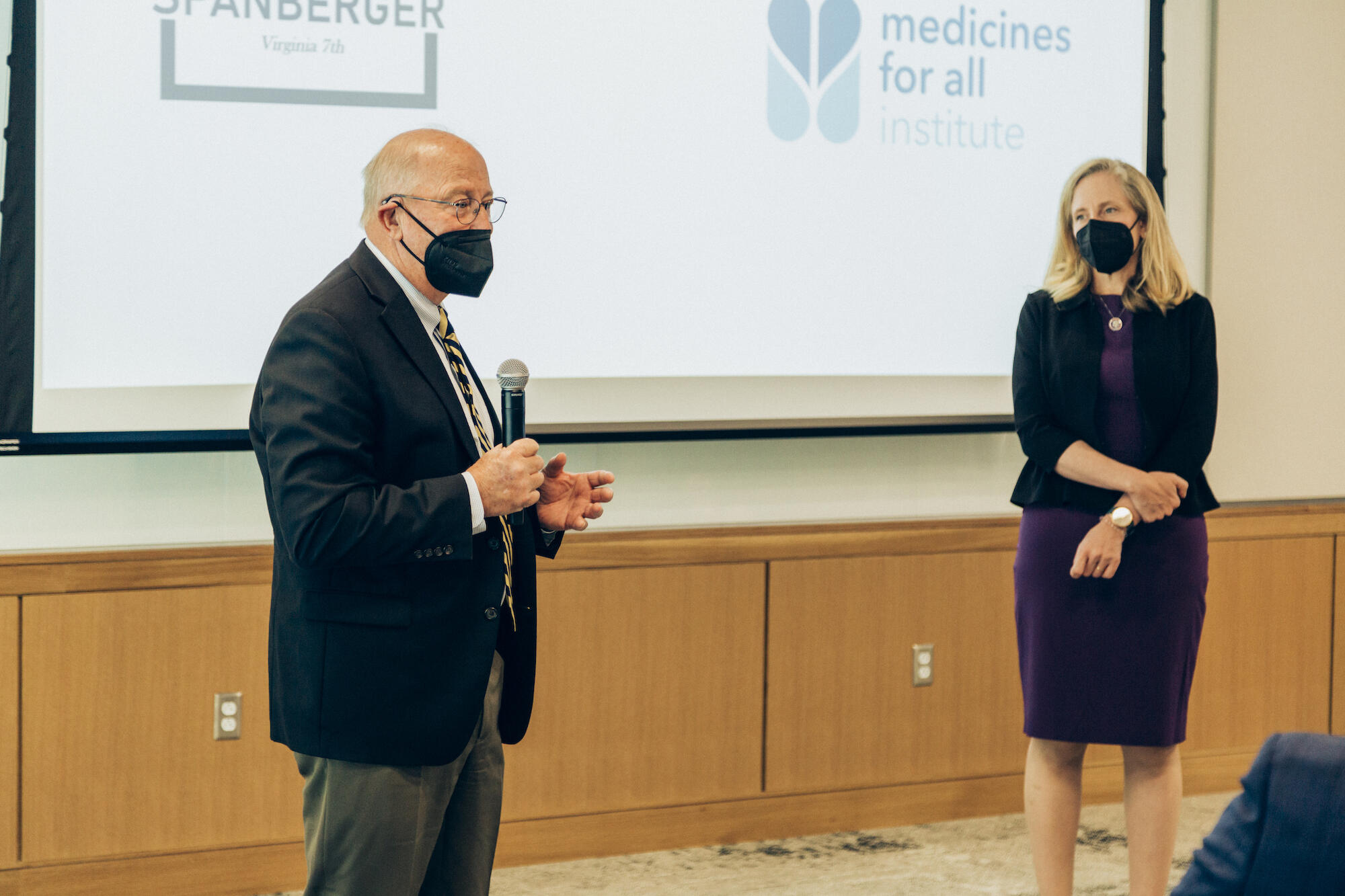
Sept. 28, 2021
Spanberger, speaking at VCU, introduces pharmaceutical readiness legislation
Share this story
On Monday, U.S. Rep. Abigail Spanberger spoke at the Virginia Commonwealth University College of Engineering to announce the introduction of legislation to create an emergency supply of key ingredients used in essential generic medicines and to incentivize domestic manufacturing of these ingredients.
Spanberger’s Promoting Readiness and Ensuring Proper Active Pharmaceutical Ingredient Reserves of Essential Medicines (PREPARE Act) would help create and support new jobs within the Richmond area’s burgeoning biopharmaceutical sector and help strengthen America’s domestic pharmaceutical supply chain.
The United States currently depends on other countries for a range of pharmaceutical products — including many active ingredients that are essential for manufacturing generic prescription drugs. Generic drugs make up 90% of all prescriptions filled in the U.S. — and about 87% of facilities for generic medicines are located overseas.
“Our bill is a step forward toward fixing these issues by creating a list of essential medicines and ensuring that the supply chains for these drugs are based here in the United States, using the most up-to-date technology,” Spanberger said. “The bill also recognizes that Virginia is leading the way into this future. In addition to new job creation, this expansion brings with it a clear vision, a vision for American made, homegrown manufacturing of pharmaceutical ingredients, a strong domestic supply chain and a skilled workforce that will be vital to making sure our nation competes and wins in the 21st century.”

Spanberger’s PREPARE Act would require the U.S. secretary of health and human services to maintain a list of essential generic medicines and build out a domestic supply of the active pharmaceutical ingredients necessary for those medicines, with a preference for domestic manufacturers and contractors.
VCU’s College of Engineering was chosen as the announcement venue because of its preeminence in developing methods to drive down the cost of pharmaceutical manufacturing and address potential vulnerabilities in the domestic supply chain.
VCU Engineering’s Medicines for All Institute is an internationally recognized leader in efforts to improve the manufacturing of generic drugs by curbing waste, cutting costs and reducing pollution. Founded in 2017 to provide essential medicines to developing countries, the Medicines for All Institute added domestic drug manufacturing to its portfolio in 2020 to ensure the U.S. would not face pharmaceutical shortages.
“We have been working globally for years to develop new, low-cost methods for the production of drugs to treat HIV, malaria and tuberculosis. That led us to apply the same principle to generic medicines that are needed in the U.S., as well as in other parts of the world,” said B. Frank Gupton, Ph.D., the Floyd D. Gottwald Jr. Chair in Pharmaceutical Engineering and professor and chair of VCU’s Department of Chemical and Life Science Engineering.

The college plays a key role in training the highly skilled workforce of chemical and pharmaceutical engineers that will be needed to meet the PREPARE Act’s mandate to shore up the nation’s supply of active pharmaceutical ingredients for a national stockpile. VCU Engineering and VCU’s School of Pharmacy currently offer the country’s only doctorate in pharmaceutical engineering.
VCU Engineering is well-positioned to help train the workforce that will support the PREPARE Act’s focus on domestic pharmaceutical manufacturing because its approach “reaches across to the medical campus, the chemistry department, the physics department and the business school” to solve complex, holistic problems, said Gupton, CEO of the Medicines for All Institute.
At VCU Engineering, Spanberger and Gupton were joined by VCU President Michael Rao, Ph.D; VCU Board of Visitors Rector H. Benson Dendy III; VCU Provost and Senior Vice President for Academic Affairs Fotis Sotiropoulos, Ph.D.; and ChamberRVA President and CEO Brian Anderson.
“We thank congresswoman Spanberger for her leadership on this important issue,” Rao said. “The PREPARE Act is an important step forward for our national security and our economy.”
Gupton said Spanberger’s announcement at VCU Engineering signals an important alignment of government, industry and academia to address one of the most pressing issues facing health care in the U.S. today.
“Today, nearly all of the active ingredients and/or their starting materials for Americans’ essential medications come from overseas, leaving us vulnerable to shortages,” Gupton said. “The efforts that congresswoman Spanberger and her team have focused on to address this issue is a major milestone toward making our country self-sufficient with regard to access to health care.”
Subscribe to VCU News
Subscribe to VCU News at newsletter.vcu.edu and receive a selection of stories, videos, photos, news clips and event listings in your inbox.







